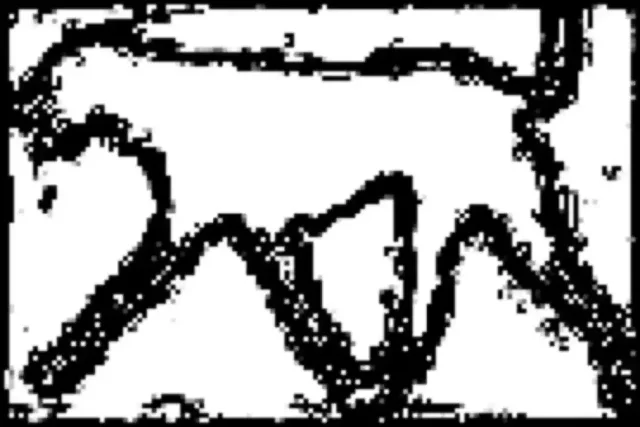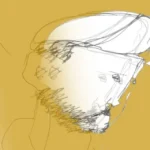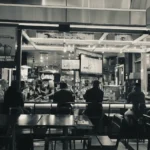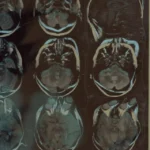This chapter was actually the original starting point of the novel. It came originally from a short story.
The story was about a sexless and genderless protagonist who had decided to join an interplanetary trip. The trip was one way. No returns.
So, our hero, or heroine, decides to visit everybody they’d hurt during their long and disreputable life. Whether these visits are to apologise or to ask for apologies becomes clear with each meeting before final blast off.
A few months after Jimmy the Phoenix gave me the letter and I reminded him to give me the money, I stood looking at the front door of what had very briefly been my home: the half-way house. It was a cold Wednesday morning in October with the wind coming in from the east whipping salt into my hair. This would have been a year after we all heroically fought the sickness off. It was around the time when most people were getting off to work in the morning.
I had been there to re-acclimatise to things like actual food, going outside, and not sleeping alone. It was a well appointed building, tall, thin, with lots of depth. I liked it. It was very much like me. It was a gothic, red brick; imposing and still mundane. Victorian. It stood in a row with others of its ilk in the middle of the once grand navy town of Porthampton – now gone to seed since the sailors left. Buildings like recollections are never entirely the same even if they’re built by the same group of people, they’re only similar. This one had been a family home, with rooms upstairs for staff. In my room, under a loose floorboard, I’d found a diary written by an over-educated maid. I looked under the floorboard because that is what any sane person does when encountering a loose floorboard. Not doing so shows a distinct lack of curiosity, therefore imagination. Unimaginative people are not fun or useful. You’re one hundred times more likely to find yourself kidnapped if your bodyguard lacks the imagination. Unimaginative muscle isn’t even any good for sex most of the time.
As I write this section of my story using pen and paper. I am looking out of a window overlooking Dublin Bay – like the Bay of Naples but with fewer calories – and I’m hoping it will relax me. This process is supposed to be cathartic. So far, however, it is anything but. I swear to fuck that I will start drinking and drugging again unless something good comes from this.
“Calm down, love”.
The voice is coming from the other room, no not in the feeble analogy to death, but from the kitchen probably. The voice cheers me up. My love is back from the market with all the ingredients for tonight’s meal. Such a beautiful love. I will move away from this hard seat at my writing table. I will sit and warm in the red leather armchair, drink some camomile tea and try to remember the half-way house, which I should never have been allowed to leave.
In each of the rooms, in the hallways and staircases some good-hearted person had hung framed prints of famous paintings to raise our consciousness or spirits or eye-lines.
I had Ophelia by John Everett Millais in my room opposite my bed so the evening light from the window fell on it. She was floating in a river or pool, ‘incapable of her own distress’. She was either dead or soon to be dead. By suicide or having fallen from the broken branch of a willow tree, the debate rages about that. I often looked at her and thought how good it would be to join her in there, just floating down stream, staring up at the sky keeping company with daisies, poppies and Dead Men’s Fingers. It calmed me right down.
Anyway, there I was looking at the thick dark blue door of the half-way home. Someone had pasted an electric pink A4 poster with a picture of a blond man and the words, “He’s Right. Free Him Now!” on it years or months before. No one had bothered to remove it so it had faded so much that the hair was almost invisible while the dark eyes and small, fat lips gave the appearance of a badly made-up clown. I had no idea if the man was right or free. I hoped he was. I was ready to go. Love crimes and death crimes had all played out inside that building, and a small, cowardly part of me wanted to go back in because it was familiar and about as familial as I’d ever known. That was no longer an option though. I’d agreed to a deal, I had the travel money and the accommodation.
It was time to forge ahead.
That was life in those days.
Lots of forging ahead away from the sickness of the past.
I had a few nest-eggs tucked away around the world. Nothing too showy but enough that I was clear of money worries for a while. I’d said my goodbyes and packed up my belongings and the mysterious envelope. I travel light and buy what I don’t have when I get where I’m going. I’d never settled anyway, which made prison life less unbearable for me than for many other people who cried their eyes out with fear, indignation and home-sickness. Home is where the heart is, wherever I buy my hats.
As I stood there, everything I was wearing was out of date, which rankled slightly. I was wearing a long, camel hair coat, my stoutest, brownest, leather jackboot style boot boots, a dark purple cotton weave suit, with a slightly yellowed polo shirt, long sleeved, Fred Perry. I wiped my right cheek dry. I made sure my wide-brimmed hat was dust free and at a sensible angle. I wore my grey-framed spectacles for clear vision and because of the distinguished air they lied to other people about. I was ready. I was ready for anything.
So I thought.
The weather was crisp and clean. The sky is crackling blue. I could feel the weak sunshine on my back as I looked at my crazed reflection in the cracked paint of the door. I made a decision that even now after everything that’s happened I remain proud of. I decided not to look back.
Not that I had any choice but you have to make things yours don’t you? You have to own things.
The envelope was as light as a letter and nothing more. Maybe a love letter. Maybe blackmail. I figured that I’d probably get the chance to steam it open en route but for the time being I just let the possibilities stew in my juices.
It was addressed, rather formally for a love letter, to Mrs Maeve Morgen, The Owner, The Four Crosses Hotel, Little Minster Street, Crosschester, CR14UX. It edged towards blackmail over love.
Wrong again.
I took one last look at the door and its faded poster of the blond guy, I smiled, turned on my heels and off I went. I was going to whistle a happy tune as per the instructions but the avenue was quiet. I had learned to love and respect quiet.
So, yes, I was off to see Julianna and the other one. The immutably fabulous Julianna Górecki in the house that overlooked the park near a small, shabby memorial that was clumsily inscribed with a commemoration to seven young lads who had died on a beach in 1918.
As I set out, my aunt Bernadette was ill. Not her usual, “Don’t worry about me, I’ll be fine all on my own here in the dark, just leave me here”, kind of ill. She was terminally ill. Julianna hadn’t bothered to let me know during a recent phone call. She was resigned rather than upset about it.
“She’s quite ok”, Julianna calmly.
“Well, thank Our lady, Holy Mother Mary of Sorrows”, I said sarcastically.
“My dear Laurie, that is cruel of you”, she was serious.
I walked away from the halfway house, past the prison, which looked like a child’s idea of a castle, towards one of Porthampton’s railway stations. The first person I met in my licensed freedom was a petite, dapper gentleman with a white moustache and a flat cap. Trotting ahead of him was a small, loudly ugly dog with a twig in its mouth and its tail down. The old man and his dog did not respect the quiet.
“Buster! Put that down! Buster!”, screamed the old fella.
The dog stopped, planted all four paws on the pavement and stared back at him. The old man, bent down, removed the twig, threw it away and put the dog on a lead. The dog struggled for its freedom, and barked back.
I was obviously feeling bright and breezy, “Good morning sir, your dog seems full of the joys”, I said with as much amiable politeness as I could remember.
“Fuck off and mind your business, he’s a little cunt”.
They walked on. The dog looked back at me and I swear it shrugged as if to say, “Such is life my friend, such is a life of safety in chains”.
I hated mornings. At night cold weather like the unnecessarily biting wind I was walking through has some drama to it. First thing in the morning, the cold wind was as unpleasant as a begging drunk in your favourite bar. So, as I turned the corner at the top of the avenue and was glad of my thick coat. The wind, canalised by the tall, Victorian buildings, bodied me and took some of my breath for itself and screamed away with it. I put my head down and continued to make my way.
The station was sparse, a glorified level crossing with a place to buy a newspaper and cigarettes. Over on the other platform I could see a middle aged man with wild blonde hair. He was wearing a brown, double-breasted suit that was fashionable when I went to prison, and was now shabby. His expensive shoes were clean. He was prancing from one foot to the other in a shuffled dance. He reminded me of Doctor Neil O’Neil seen through a fisheye lens pasted with Vaseline. A proper doctor, a doctor of medicine, so he said. Neil had qualified in London as a wunderkind. It couldn’t have been Neil though. Neil was dead.
Watching the man on the other platform reminded me just how much terrifying fun the combination of Neil and a big city used to be. Back then we read fashion fanzines that used Mao and Lenin as cool pinups. We listened to Post Punk and Hip-Hop and 1950s bebop jazz because it was obscure and obnoxious to the people we didn’t care for.
We had all kinds of nefarious joys and they never wore us out. Drugs were always cheap. I thought that was miraculous rather than a simple case of supply and demand. We experimented with everything. We are quite obviously immortal.
Memory is just a jigsaw. Time is just a slide down the stairs. We spent good, bad, solid, fluid time in bars where something great was playing out of battered speakers. I’d get ‘lightly minded’ as Neil’s friend Nana Adé (one of the loves of my life) put it. We’d get something to eat or we’d head to a party or a club to do unforgettable things that I no longer remember. I was practising high level cynicism at the time, so of course I didn’t understand the joy I was experiencing for what it was: a battery to help power through later life. The fun felt ephemeral, which in retrospect, is the most insane thing.
(Or a rapidly draining battery, yes, don’t tell me.)
One night we were slumming it in a decent bar in Queens or Flatbush or somewhere not Manhattan. It had some terrible rock’n’mock’oirish tunes blasting away in the background and not a sight nor the gorgeous smell of Nana Adé for days. We were drinking heavily and so unstylishly as to be very cool if any of the cro magnon men and women there could have noticed. I’d been modelling some awful designer jeans. He’d been out with his new passion, his camera, being Vivian Maier or Robert fucking Doisneau, snapping street pictures. I doubt he ever bothered to get the pictures developed. He probably gave the camera away in return for anal or drugs.
He touched my fashionably bare knee and asked:
“Do you think animals have a sense of history? When your pet’s sitting there watching an old black and white Lassie movie on TV with you do you reckon she thinks, ‘That dog there, she’s definitely dead’”?
“Dogs only see in black and white don’t they?”
I thought about it some more and told him that it was a stupid fucking question, because I didn’t have any pets, never had. And anyway, history was bunk.
“What’s the world to be without stupid questions?”
“That wouldn’t be a sense of history anyway, it’d be a sense of time”, I said thinking I was making a good point.
We drank and pretended to think profoundly when we were really thinking about where to get drugs or laid or a fast car. But had there been any silence in that bar, Neil would have broken it.
“Time just happens all the time, history has to be repeated”, he said.
“Sure”, I said signally for another round of drinks.
Just then Nana walked in, turning heads and giving them the long, elegant finger. She took the drink from Neil’s hand, knocked it back, kissed him gently on the lips, smiled at me and said.
“It’s over, Neil. We’re done”.
And she walked out.
Dr O’Neil pretended not to care. He cared. You could see he cared. Not only was it a direct and public insult to his big-dick energy, he also loved Nana like a friend, he cherished her company.
“I loved her”. He told me this in the professionally tacky bathroom where badness happened with exhausting regularity.
“I loved her more than my own mother and sister”, he said as we set to drinking highball glasses of J&B and San Pellegrino on the rocks.
“I know”, I said because I loved her in the same way.
One after the other and the other and the other, highballs then straight shots, tequila of course. By the time we left we were coke lipped and bent crazy.
He wept as I drove his black Buick Grand National GNX fast and way too straight back through Flatbush and to Manhattan. We hit a bump, I kept driving. Not my car. Probably not even Neil’s. On we went, my god I drove that thing hard. Next afternoon when we got up to go and get brunch there was a dent in the car. We went for pancakes with lots of coffee. I left for a culturally offensive modelling job in Egypt the next day. Dr O’Neil told me he’d sold the car to an Arab he knew from Williamsburg or somewhere. It was a fun car.
Back on the platform of the Porthampton suburban station I wished I’d stayed in touch with Nana Adé before she’d left New York for Kinshasa and all points in between.
“Stop staring at me!”
The man on the other platform was shouting and pointing at me.
“It’s making me very anxious!” he yelled.
“I’m sorry! You remind me of someone I used to know!” I yelled back with what should have been a lame excuse.
“That doesn’t make any difference to me! Stop staring why don’t you!?” he sounded distraught rather than angry.
He turned his back on me. He looked nothing like Dr Neil from the back.
“I’m sorry! It won’t happen again I can assure you!”
The man on the other platform smiled, his train arrived and he got on. A few minutes later mine pulled in and I boarded. He left a bad, no not bad, more strange impression on me. I realised that this was due to the fact that he reminded me of an aged Dr O’Neil. I had never met old Neil. He was a ghost. The ghost of some high times when Neil and I would share everything, every experience, every deed no matter how dark or how joyous. A short but intense period in New York, London, Paris and all points in directions that I can’t – don’t want to – remember. I tried to shrug my strange impression off as my train pulled out on its way to Porthampton Central station and beyond. It had taken a long time for me to fall for my own lie that I’d moved on from Neil O’Neil. I hadn’t.



